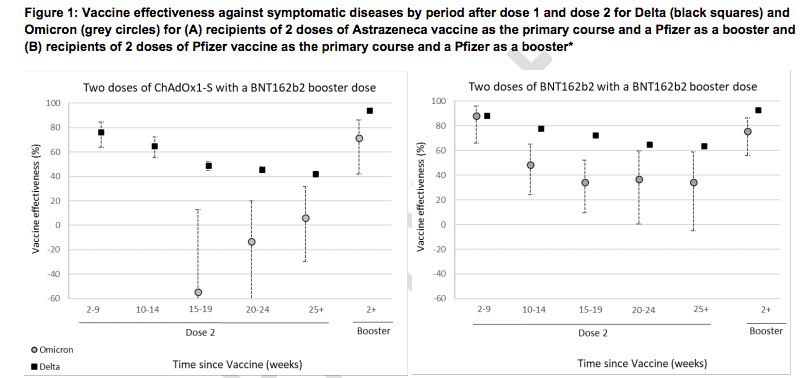A new UK study has suggested that a double dose of COVID vaccination, especially with Astrazeneca, may be insufficient to protect against Omicron. However, booster shots may close the immunity ‘gap’.
The survey was carried out by the UK Health Security Agency (UKHSA) in collaboration with scientists of various institutes. It comprised 581 symptomatic Omicron COVID cases – a relatively small sample, reflecting the small amount of Omicron cases thus far discovered in the UK.
COVID vaccines have been highly effective in guarding against symptomatic COVID, and even more so against severe disease under the original virus and the Alpha variant. This efficacy was modestly reduced against Beta and Delta variants, but with defence against severe disease remaining high. Omicron may be set to break this protection.
Effectiveness of both Pfizer and Astrazeneca vaccines against Omicron was lower from 9 weeks post dose 2. For Pfizer, efficacy dropped from 88% to 48.5% at 10-14 weeks post dose 2, and then even further to about 35.5% from 15 weeks.
The data for Astrazeneca was even more damning, with the study stating “among those who had received 2 doses of [Astrazeneca], there was no protective effect of vaccination against symptomatic disease with Omicron”.
However, some hope still lies in booster shots. The authors state that those vaccinated by Astrazeneca showed an increase to 71.4% effectiveness after receiving a Pfizer booster. For those with Pfizer, a further Pfizer booster upped effectiveness to 75.5%. Booster shots have been a hot topic worldwide, with many against their rollout due to vaccine shortages in developing countries.

The authors of the study also remain optimistic about the ability of vaccines to stop severe disease under Omicron, including hospitalisation and death. They believe effectiveness against severe disease could be higher than estimates of protection against symptomatic disease. This stance may be helped by early suggestions Omicron infections tend to be milder than Delta or previous variants.
Nonetheless, it is still too early to tell whether double-dosed vaccination is enough to keep people out of hospitals. Omicron has already been labelled a variant of ‘concern’ by many worldwide, with predictions it will fast become the dominant strain of COVID in many countries.
A small Scottish study predicts the majority of cases in Scotland between mid-December and early January next year will be Omicron. The scientists of the UKHSA study agree, saying Omicron is projected to become the dominant variant in the UK by mid-December, based on current trends.
Moderna and Pfizer have both made statements on plans to test variant-specific vaccines imminently.
Follow Maddie’s journalism journey on Twitter.
Sign Up To Our Free Newsletter